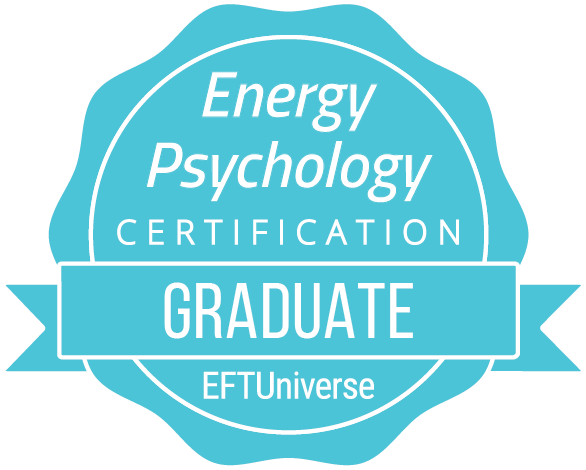WHAT IS EFT – EMOTIONAL FREEDOM TECHNIQUES?
EFT is a powerful, evidence based, self-help method based on research showing that emotional distress contributes greatly to many problems, including addictions and anxiety, cravings and weight issues, fears and phobias, PTSD and a number of serious illnesses. Clinical trials have shown, with statistically significant results, that EFT tapping on acupressure points is able to rapidly reduce the emotional impact of memories and situations that trigger emotional distress. Once the distress is reduced or removed, the body can often rebalance itself and accelerate its own healing.
The Science of EFT
Numerous studies have shown that distressing emotions cause our bodies to produce higher levels of stress hormones, which in turn, intensify the distress we are experiencing. If we don’t interrupt it, this can keep us in a never-ending loop of misery.
Clinical trials have proven that EFT safely interrupts this stress cycle by alleviating the emotions that are causing it and by signaling our bodies to calm down and return to a state of balance.
Why Stress Hurts
- Both Cortisol and DHEA are produced by the adrenal glands. When Cortisol production goes up, production of DHEA, the health-promoting hormone associated with cell repair, goes down.
- Long term exposure to Cortisol and other stress hormones suppresses the immune response, reduces bone formation, decreases muscle mass, reduces skin elasticity and damages cells in the brain responsible for memory and learning.
- DHEA is the most common hormone in the body and is vital for cell regeneration and other life-enhancing functions that promote health, memory and longevity.
Why EFT Tapping Helps
- When an upsetting memory is recalled, along with awareness of the site in the body that holds the primary memory of the upsetting event, tapping sends calming signals to the brain and a message of safety to the body that is not congruent with the emotionally arousing memory. This message of safety disengages the memory from the stress response.
- Cortisol is reduced, DHEA is increased, and the body becomes calm and able to resume its healthy functions.
Tapping to Alleviate Grief
If you are grieving, do you believe that in order to remember your loved one who died, you have to keep feeling sad because it’s wrong to feel happy without him or her? Or that if you are still hurting, it means there’s something wrong with you? Or that the best way to deal with your grief is to be stoic, present a brave face to the world, and just get on with your life? These are the societal messages you may have received and believe, but there are far better ways to cope with your grief and find your way forward.
Whether you’re grieving or have experienced another form of trauma, you can relieve the intensity of your suffering, and you can do it without medication.
So, even though you cannot heal the loss itself, you can soothe and relieve your emotional distress as you move through the grieving process toward healing and your new life.
Here’s How Tapping Helps
- Grief and mourning are not the same thing. Grief is how we feel on the inside when our loved one dies and also when we’ve lost a part of ourselves to trauma. Mourning is expressing our grief outwardly, and it is through mourning that we heal.
- EFT helps us mourn and heal by gently connecting us with our inner feelings and emotions, even the ones we may not be fully aware of, and bringing them into our conscious awareness in a safe, healing way.
- This involves tapping with the fingertips on certain acupuncture points while talking about our distressing feelings and memories.
- Tapping while talking sends soothing signals to our brains and changes our emotional response.
- Tapping in this way tells our brains to stop releasing the stress hormones that cause us to feel emotional distress and to start releasing healthful hormones that relax us and help us feel calm and at peace.
- When this happens, our memories are disengaged from the stressful, troublesome response. We are now able to remember our loved ones and other memories without the negative emotions.
EFT RESEARCH ARTICLES
Chambless, D., & Hollon, S. D. (1998). Defining empirically supported therapies.Journal of Consulting and Clinical Psychology, 66, 7–18.
Church, D. (2013). The EFT manual (3rd ed.). Santa Rosa, CA: Energy Psychology Press.
Clond, M. (2016). Emotional Freedom Techniques for anxiety: A systematic review with meta-analysis. Journal of Nervous and Mental Disease, 204(5), 388–395. doi:10.1097/NMD.0000000000000483
Meta-Analyses and Systematic Reviews of EFT Research: Research.EFTuniverse.com.
Emotional Freedom Techniques to Treat Posttraumatic Stress Disorder in Veterans: Review of the Evidence, Survey of Practitioners, and Proposed Clinical Guidelines
Citation (APA Style): Rowe, J. (2005). The effects of EFT on long-term psychological symptoms. Counseling and Clinical Psychology, 2(3), 104-110.
http://www.eftuniverse.com/index.php?option=com_content&view=article&id=2445




